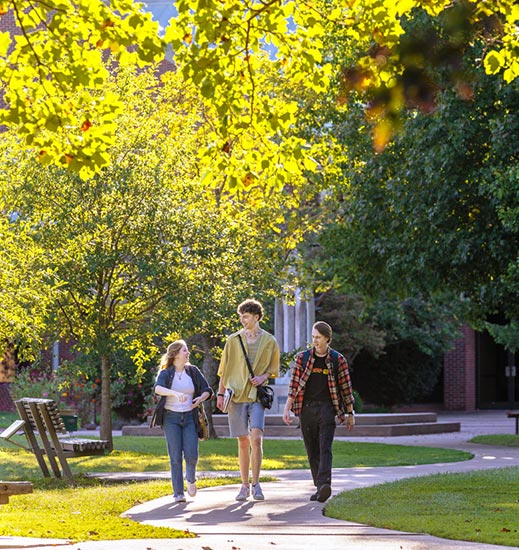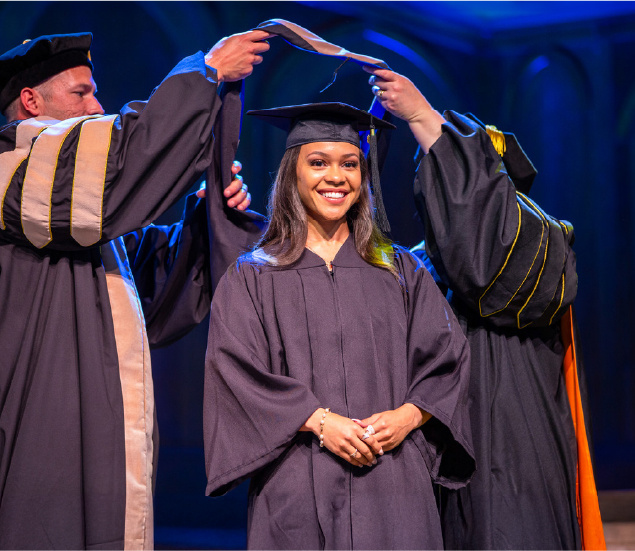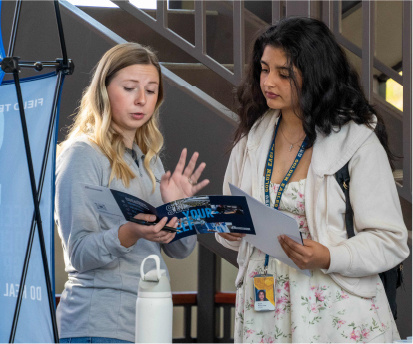- Give
- Alumni and Parents
John Brown University
2000 W. University St., Siloam Springs, AR 72761479-524-9500
jbuinfo@jbu.edu
Become a Licensed Professional Counselor
You have a heart for helping others—now gain the knowledge and credentials to make a lasting impact. JBU’s CACREP-accredited MS in Counseling provides Christ-centered academic, clinical and dispositional training to equip you to pursue licensure as a Licensed Professional Counselor (LPC) or Licensed Mental Health Counselor (LMHC). Whether you have a background in the helping professions or are planning a career shift, you'll graduate ready to serve the Kingdom by serving others.
Classes that fit your schedule and learning style
Over 70% of coursework can be completed through a combination of online and weekend face-to-face classes, including all coursework prior to the practicum and internship sequence. Weekday face-to-face classes are also offered for those who prefer a more traditional learning experience. Whether you're working full time, raising a family, or navigating a career change, JBU’s MS in Counseling offers flexible course scheduling so that you can balance work, life and learning.
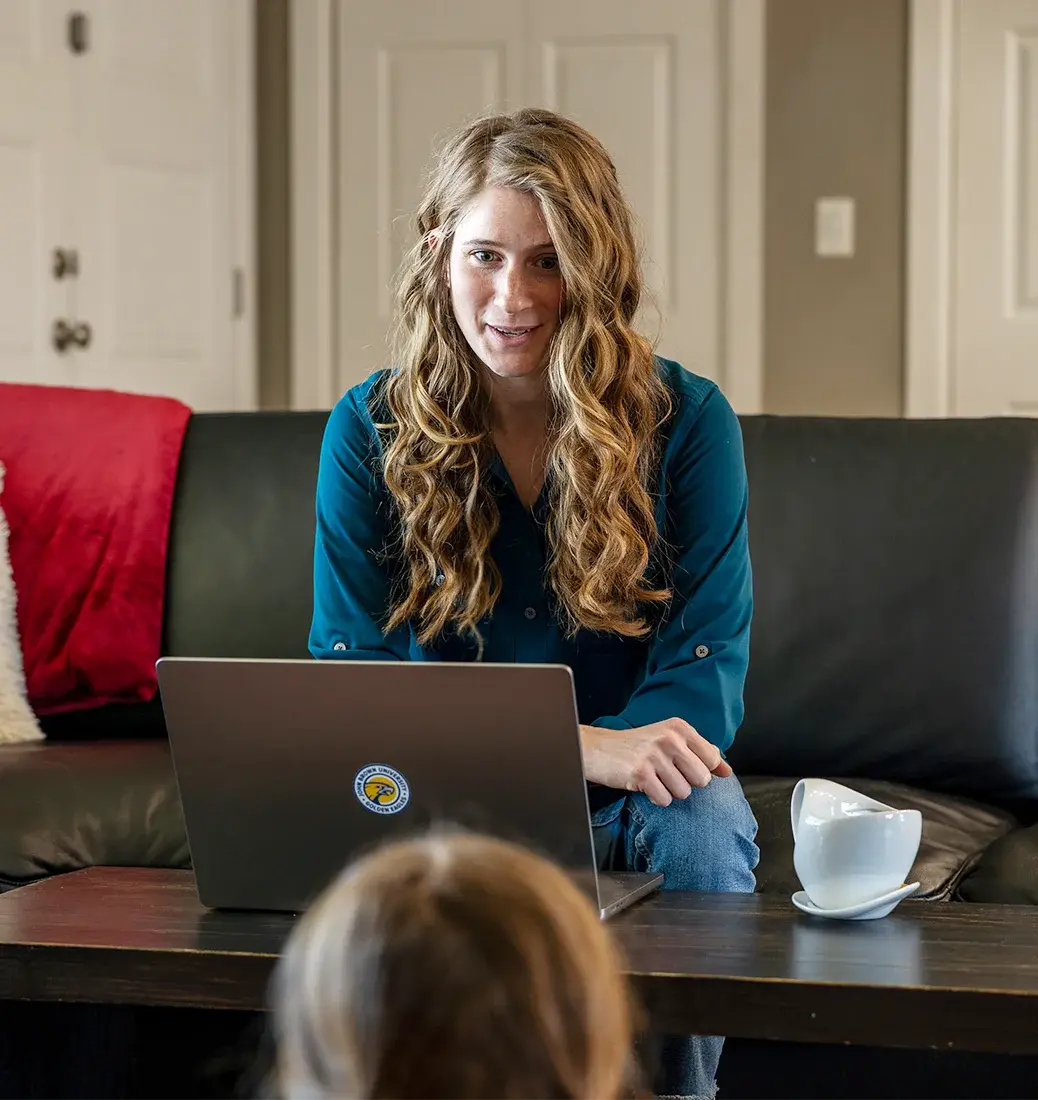
Hands-on, in-person clinicals
Counseling is built on trust, presence and personal connection. That’s why, as you move into the practicum and internship sequence, you'll engage in face-to-face clinical work under close faculty supervision. You'll gain the confidence, skill and relational depth essential for professional counseling practice.
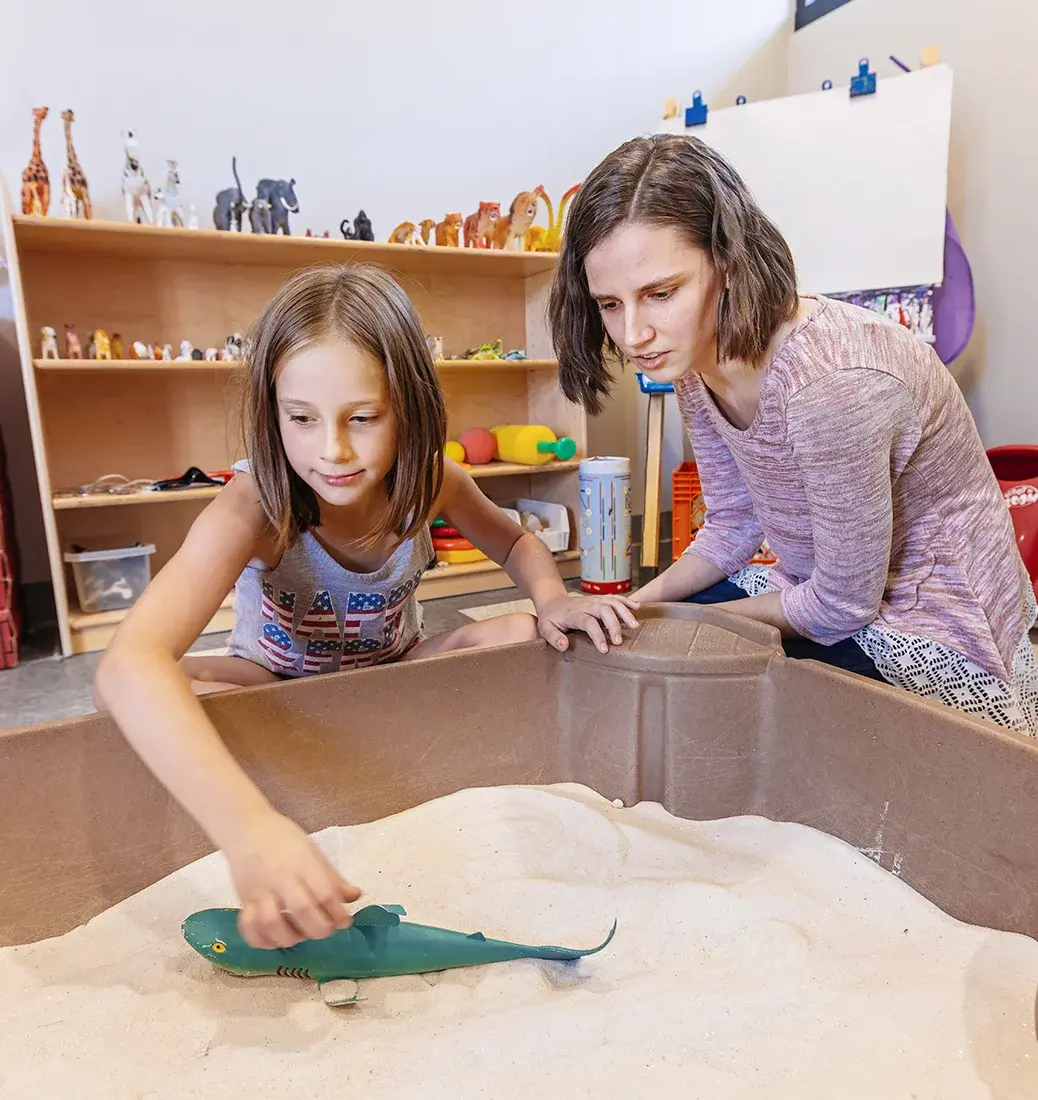
Thinking about a visit to campus?
We’d love to show you around. Connect with faculty, explore campus and get answers to your questions.
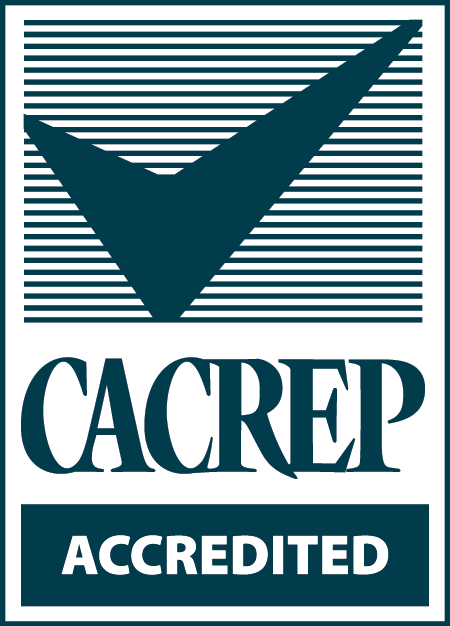
The Council for Accreditation of Counseling and Related Educational Programs (CACREP), a specialized accrediting body recognized by the Council for Higher Education Accreditation (CHEA), has granted accreditation to the M.S. in Counseling program at JBU through March 31, 2032.
What to expect at JBU
Experienced faculty
Our faculty are licensed counseling professionals with active clinical caseloads so they understand the demands and changing nature of being a counselor.
Flexibility
JBU's flexible program formats honor the deeply personal nature of counseling while providing the flexibility to balance your personal and professional commitments.
Christ Over All
We strive to equip servant-leaders to pursue service in the helping fields in response to the great commandments of loving God and loving people.
Choose an emphasis that aligns with your calling

Marriage & family therapy
Through the integration of classroom instruction and clinical preparation, students are exceptionally equipped for careers and ministry positions where they provide marriage, couples and family counseling.

Play therapy
An emphasis in play therapy teaches students to use a variety of play and creative arts techniques to better assist children to communicate or express their thoughts and feelings.

Adventure therapy
Students graduate ready to use experiential therapy to promote healing, encouraging clients to reflect upon experiences using goal-based activities that provide a window into their unique mental traits and challenges.
The future you starts at JBU.
What sets JBU apart?
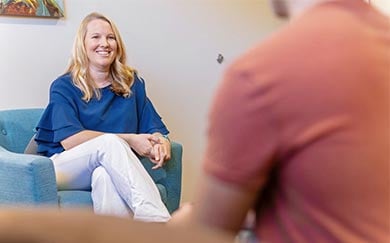
100% clinical placement rate
JBU actively supports students in securing clinical placements utilizing 44 clinical sites across Arkansas, Missouri and Oklahoma. Our students have consistently achieved a 100% placement rate in required practicum and internships.
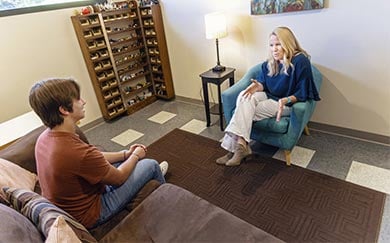
National exam pass rate
In 2023, ninety-seven JBU counseling graduates took the National Counseling Exam (NCE) as part of the licensure process in Arkansas, and 87% of these graduates passed this exam.
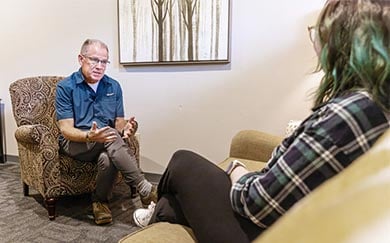
Job placement rate
In 2023 there were 61 graduates from the counseling program, 97% of whom landed employment or were enrolled in further graduate studies within six months of graduation.
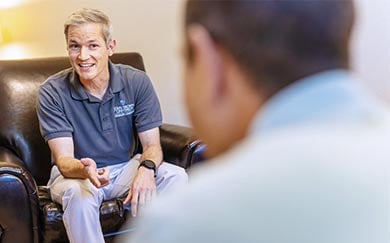
An integrative approach
JBU is the longest-standing counseling program in Arkansas and takes an integrative approach to counseling/psychology and faith/theology within a professional and ethical framework.

Flexible formats
JBU's flexible program formats honor the deeply personal nature of counseling while providing the flexibility to balance your personal and professional commitments.
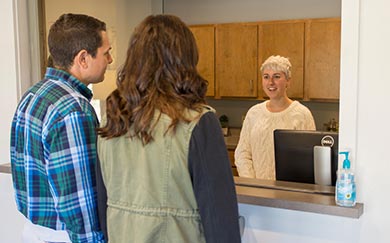
Community Counseling Clinics
JBU operates two Community Counseling Clinics (Siloam Springs & Little Rock) that provide low-cost or no-cost counseling to those in need. The clinics are training sites that allow counseling students to practice their clinical skills under the supervision of licensed faculty members.
Why JBU?
See what our alumni have to say.
Hanna Burge '20
"I entered the program with the plans to change lives, but I ultimately ended up finding my own life within the mix. I am overall a healthier person in all areas of my life and feel confident and equipped to face challenges that come before me both as a mental health clinician and as an individual."

Betsy Dedrick '20
"I have made lifelong friendships and community connections that will serve me and my clients well in the future. The program helped me believe in myself and my ability to conquer tough goals. . . The professors are top notch and integrate faith as well as their professional experiences into the program. They walk the walk and talk the talk. Amazing, all-giving and family atmosphere offers support, understanding, and lifelong friendships!"

Kelsey White '19
“I feel like this program not only helps you grow academically, but it helps you grow personally. The teachers here are very intentional about getting to know you and want to help you understand what your counseling style is, and then helping you grow in that.”

Career outlook
Employment of mental health counselors is projected to grow 19% from 2023 to 2033, much faster than the average for all occupations. JBU's program prepares you to help meet that need.
Admission requirements
- Apply online.
- Send official transcripts (sent by your institution via an electronic transcript delivery service or email to systems@jbu.edu). A bachelor’s degree with at least a 2.75 GPA from an institution accredited by accreditation bodies recognized by the Council for Higher Education Accreditation (CHEA) and the U.S. Department of Education is required for admission.
- Complete an individual interview with a graduate counseling faculty member.
Degree requirements
The MS in Counseling requires 60 total credit hours. Full requirements can be found in the university catalog and the Graduate Counseling Handbook.
- 41 credit hours of counseling core requirements
- 16 credit hours of clinical requirements, including:
- One 3-credit-hour practicum, requiring 100 clinical hours at a JBU Community Counseling Clinic in Siloam Springs or Little Rock
- A 6-credit hour internship, requiring 600 clinical hours at an external agency or practice, taken in two 3-credit-hour courses over two semesters
- 3 credit hours in an emphasis of your choice
Licensure
Graduates of this program are eligible to pursue licensure as Licensed Professional Counselors (LPC) or Licensed Mental Health Counselors (LMHC) in most states. Specifically, this degree was designed to meet the educational requirements for licensure (LPC) in the state of Arkansas.
Frequently asked questions
What are the program's clinical/field experience requirements?
The program integrates real-world clinical training through a structured practicum and internship sequence, ensuring you develop the skills needed for licensure and professional practice.
Practicum: Building Foundational Skills
Before beginning an internship, students complete a one-semester practicum to gain initial hands-on experience in a supervised clinical setting. Practicum requires 100 total clinical hours, including:
- 40 direct client contact hours (counseling individuals, couples, or groups).
- 60 indirect hours (case documentation, treatment planning, supervision, and professional development).
Practicum is conducted at JBU’s Community Counseling Clinics in either Siloam Springs or Little Rock and provides a structured environment to develop core counseling competencies before transitioning to an external placement.
Internship: Advancing Clinical Competency
The internship is a two-semester requirement designed to deepen students’ counseling experience in an approved community agency or practice. Interns must complete 600 total clinical hours, including:
- 240 direct client contact hours
- 360 indirect hours
Internships include weekly group supervision and individual oversight by an on-site licensed professional. This phase helps students refine their clinical skills, apply ethical decision-making and transition into professional practice.
Can I work while enrolled in the M.S. in Counseling degree program?
Yes! Most counseling students work while matriculating through the program. However, during the practicum and internship phase of the program, students need to commit 20+ hours per week toward the completion of their clinical hours.
What is the typical counseling class size?
Most classes are capped at 24 students, but a number of clinical courses have lower caps due to the skill-based nature of the class.
What is a typical class like?
A typical counseling class meets for 2.5 hours where roughly 12-20 students interact with the latest psychological research, evidence-based practices, diverse theological values/commitments, and cultural competencies under the direction/supervision of program faculty who are licensed clinicians.
Courses meet for 16 weeks and are highly interactive and academically rigorous. Certain courses are focused specifically on counseling skill development in preparation for Practicum/Internship courses where students are providing actual counseling to real clients.
What is covered in the admissions interview?
A graduate counseling faculty member will ask you questions related to:
- Future goals
- Why you are interested in counseling
- How your previous work has prepared you for a helping profession
- Previous academic studies
- Strengths and weaknesses as a helper
- Feedback on JBU’s faith-based mission
- Cultural differences and relationships
Do I have to be a Christian or know the Bible well to enroll in the program?
There is no faith requirement to enroll in the program as a student. However, all JBU employees, including faculty, regularly affirm the university's statement of faith, and graduates of the program are expected to demonstrate an understanding of a spiritual/religious/Christian worldview as it relates to counseling practice.
Nationally Recognized
The Wall Street Journal: #1 private university in Arkansas
Money: #1 best value among colleges and universities in Arkansas and Oklahoma
Forbes: Top 10% nationally for financial strength, earning highest grade in Arkansas
College Consensus: Best Online Colleges & Universities
Employers know when they see "John Brown University" on your resume, they'll be getting top talent.
Explore our graduate programsReal-world application
Whether you're a business student developing a strategic plan or a counseling student conducting live therapy, you'll have the opportunity to apply what you're learning through hands-on experiences.
Explore our graduate programsEngaged & experienced faculty
JBU's expert faculty will bring your coursework to life with extensive field experience and also teach you how to incorporate your faith into your work. They are invested in your success and will be a valuable resource during your time at JBU and beyond.
The future you starts at JBU.
Resources
Policy Information
JBU does not unlawfully discriminate based on race, color, national or ethnic origin, sex, age, disability, marital status, military status, or age in the administration of its educational policies, admissions, financial aid, employment, educational programs, or activities.
John Brown University is a leading private Christian university, training students to honor God and serve others since 1919. Arkansas’ top-ranked university (The Wall Street Journal) and top-ranked regional university (U.S. News), JBU enrolls more than 2,200 students from 37 states and 42 countries in its traditional undergraduate, graduate, online and concurrent education programs. JBU offers more than 50 undergraduate majors, with top programs including nursing, psychology, construction management, graphic design, family and human services, and engineering. Eighteen graduate degrees are available in business, counseling, cybersecurity, and education.
Copyright 2026 John Brown University. All rights reserved.
